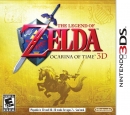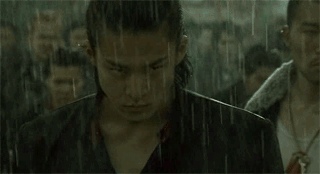RolStoppable said:
MTZehvor said:
I don't want to drag an off topic conversation out too much longer, but the fact that you don't feel pressure is, to me, quite telling. The story is designed around the concept of pressure; consistently telling the player that they need to hurry or else humanity will die out. With a central narrative based around enforcing a sense of urgency, the gameplay should, ideally, set up in such a way to allow the player to play as if they are really in the story. While I wouldn't advocate an actual time limit (I'm more than aware of how the countdown works) that drops down like in Majora's Mask, I think the complete opposite end of the spectrum simply disconnects people from the main story.
To illustrate with an example, take something like the final bit of Skyward Sword, where Ghirahim has captured Zelda and is going to drain her soul (or whatever he does) to resurrect Demise. Now imagine that the game, instead of encouraging you to chase after him, forced you to go save someone's cat or paint someone's house. You'd probably reasonably assume, as the player, that Zelda couldn't be in that much trouble if you've got the time to go save cats or paint houses. It's the same sort of deal here. I'm all for games heavily based around exploration; some of my favorite games of all time, such as Super Metroid and Wind Waker, require a ton of exploration. Where the game starts to lose me is when a disconnect appears between narrative and gameplay. On one hand, the game implements a story that is based around creating a sense of urgency. On the other hand, the game implements mission design that requires a deep level of exploration. That disconnect is what I'm interested in knowing if you care about.
|
It's like XCX was the first time you've played a JRPG. There are countless games that have a narrative of urgency at one point or another, yet the player's progress gets interrupted by mandatory errands or he gets to do the dumbest sidequests at his leisure.
My take on that issue? Game logic cannot mimic proper logic at all times, otherwise it is detrimental to the experience. Another example of game logic would be enemies in Super Metroid: If you kill them, they drop missiles or power bombs. This doesn't make any sense if you give it the slightest bit of thought, but it works damn well as game logic. This example obviously applies to tons of other games as well.
Once you stop to think about game logic or don't question it, such things will stop to bother you when playing a game. I am so used to it that I don't care anymore when a narrative tries to create a sense of urgency; I don't feel it if there's no time limit displayed on screen, because in such a case I immediately know that there is no need for urgency. Or in other words, time limits create urgency, narratives do not.
|
I haven't played a ton of JRPGs, though admittedly most of my experience lies in the old Final Fantasy style turn based games. I don't recall anything like that in any of the ones I played, but I could be forgetting.
For the second point, I'd argue that what you're calling "game logic" is really two seperate category. There are the obvious leaps in logic the game makes in order to circumvent the laws of nature/physics. Super Metroid has enemies drop health pickups, Xenoblade X lets you walk straight through cars, Devil May Cry lets you juggle enemies in the air with bullets, etc. Generally speaking, I think everyone can accept those. What I find myself less willing to simply go with is leaps in logic to circumvent rational decision making, and this is in large part because characters are what we get ourselves invested into (ideally, anyway). In nearly all cases, a story needs to have relatable characters to engage its audience, and if its characters are off being complete idiots, then the entire story begins to fall apart (see Metroid: Other M for details). While I wouldn't advocate that all games attempt to remain true to the laws of nature as we know them, I would argue that all games should try to make their characters' decision making at least semi realistic at all times; at least, those that are interested in telling any sort of compelling narrative.
(Tl;dr: A game doesn't necessarily need realistic physics to have compelling gameplay, but it does need realistic characters to tell a believable story)
Finally, I've never really bought into the "once you get used to it" excuse, because that is legitimately an argument of nothing more than "once you see enough examples of failure, you lower your standards." And I'd rather not lower my standards. As someone who believes that video games can be an excellent medium for storytelling, I don't think we should simply all brush off a failing that could have easily been worked around as "meh, everyone else does it, whatever."




















































